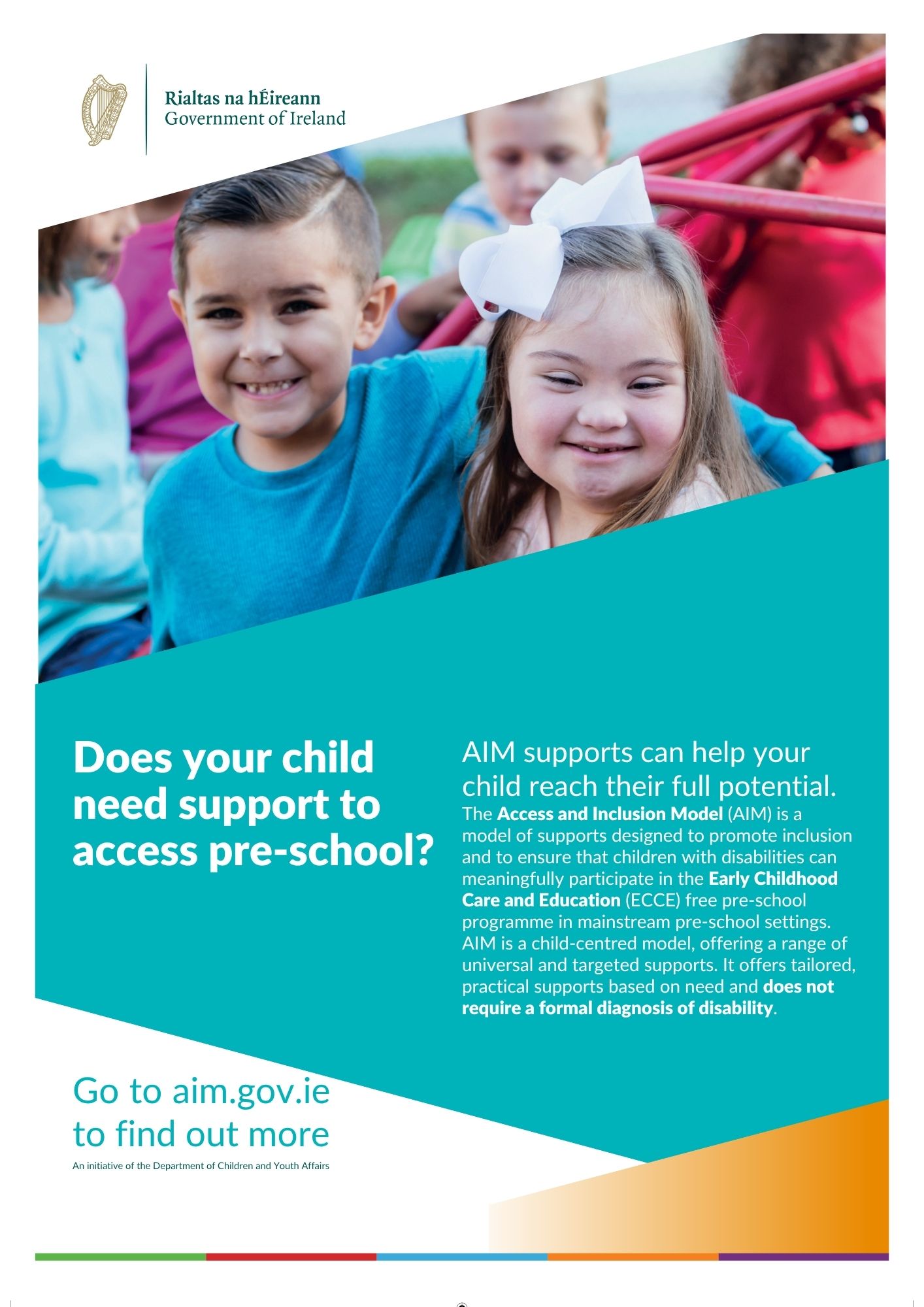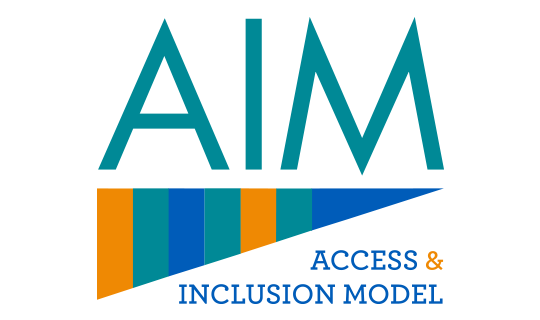The goal of AIM is to create a more inclusive environment in pre-schools, so all children, regardless of ability, can benefit from quality early learning and care. The model achieves this by providing universal supports to pre-school settings, and targeted supports, which focus on the needs of the individual child, without requiring a diagnosis of disability.
AIM commenced in 2016, since then, it has helped tens of thousands of children with a disability to access and meaningfully participate in the ECCE (Early Childhood Care and Education) programme in pre-school settings nationwide. The model has been recognised internationally and has won awards for both excellence in practice, and inclusive policy.
Next page: AIM and ECCE
Early Childhood Care and Education (ECCE)
The benefits for children of quality early childhood care and education are well documented.
Under the Early Childhood Care and Education (ECCE) Programme, all eligible children in the Republic of Ireland are entitled to free early childhood care and education (otherwise known as ‘free pre-school’) in the period before they start primary school.
With effect from September 2018, there will only be one intake of children in September each year – increasing all children’s participation on the ECCE programme to two full pre-school years, (please see the ECCE eligibility calendar).
In order to support children with a disability to access free pre-school, a major new programme of supports, the Access and Inclusion Mode (AIM), has been introduced.
Next page: Access and Inclusion Model
Access and Inclusion Model (AIM)
The Access and Inclusion Model (AIM) is a programme of supports designed to ensure that children with disabilities can access the Early Childhood Care and Education Programme in mainstream pre-school settings and can participate fully in the pre-school curriculum alongside their peers.
AIM is a child centred model of supports, involving seven levels of progressive support, moving from the universal to the targeted, based on the needs of the child and the pre-school setting. The model is designed to be responsive to the needs of each individual child in the context of their pre-school setting. It will offer tailored, practical supports based on need and will not require a formal diagnosis of disability.
Levels 1 – 3 of the model involve a suite of universal supports which are designed to promote and support an inclusive culture within pre-school settings by means of a variety of educational and capacity-building initiatives for pre-school providers and practitioners. International evidence suggests that these supports, when appropriately developed, are sufficient to support many children with disabilities.
However, where a pre-school provider, in partnership with a parent, considers that some further additional support may be necessary to meet the needs of a particular child, they can apply for one or more targeted supports under levels 4 – 7 of the model. Additional targeted supports could take the form of expert early childhood care and education advice and mentoring (level 4), specialised equipment, appliances and minor alterations (level 5), therapeutic supports (level 6) and additional capitation to fund extra assistance in the ECCE pre-school room (level 7). More information on these targeted supports is provided below.
Finally, AIM applies to all mainstream pre-school settings which are funded through the ECCE Programme. In addition to mainstream settings, pre-school services are also offered in special pre-schools and early intervention classes which cater exclusively for children with disabilities. While the underlying vision of AIM is to cater for as many children as possible in mainstream settings, it is recognised that a small number of children will continue to need specialised services.
Next Page: Targeted Supports under AIM
Targeted Supports under AIM
- A rate of €160 per week to enable a service to supplement their staffing by 10 additional staff hours perweek.
- A rate of €240 per week to enable a service to supplement their staffing by 15 hours per week.
Getting Started and Accessing Supports
You will be able to access AIM supports through your pre-school provider.
If you have not as yet identified a suitable pre-school for your child, information on childcare services may be viewed on Pobal Maps via this link. You can search by facility name or address, or browse to your location to click on the service and access further information. For a video tutorial on how to use this resource please click HERE. If you require any further assistance with using the system, please email This email address is being protected from spambots. You need JavaScript enabled to view it.. Alternatively your local City or County Childcare Committee will be able to assist you – a list of all CCCs can be found here (CCCs).
When you have identified a pre-school for your child, your pre-school provider will, in consultation with you, consider what supports may be needed to ensure your child’s meaningful participation in the ECCE Programme.
Where it is considered that your child needs additional support, your pre-school provider can apply, in partnership with you, for targeted supports under AIM. Applications are made via the Programmes Implementation Platform (PIP) on the Pobal website. Pobal are the current administrators of the ECCE programme. Your pre-school provider will be familiar with the Pobal website and with PIP.
Applications can only be made with your full consent. A copy of the parental consent form can be viewed here [Parental Consent Form]. This form should be printed and signed by the parent and should then be uploaded and submitted with the completed application. In providing consent for an application to be made, you are also providing consent for information on your application to be shared with relevant professionals involved in processing the application and providing supports under AIM (eg. Early Years Specialist, HSE occupational therapist, Pobal officials etc.).
Where an application for supports has been made, Pobal will process the application and will inform both the parent and the pre-school provider of the decision reached. Where a parent, in partnership with a pre-school provider, is unhappy with the decision reached by Pobal, they can seek a review. More detail in relation to the process of decision making is available here under AIM rules 2022/2023.
AIM Policy and Rules
The AIM policy places the child at the centre and recognises the important role of the parent in all decision-making concerning access and participation.
All pre-school providers and staff should be familiar with the AIM Policy & Rules. Pre-school services that avail of AIM are obliged to comply with these rules. They are a useful resource for both parents and for the early learning and care sector.
Compliance checks will be included for the Access and Inclusion Model in 2024 to confirm adherence with programme rules. Further information on these checks are included in this rule document.
| AIM Policy & Rules 2024/2025 (PDF) |
